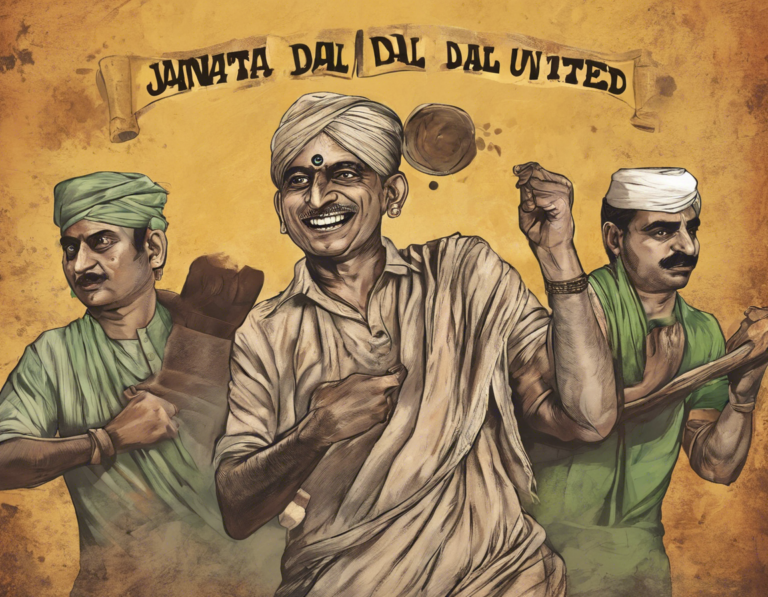
Janata Dal (United), commonly known as JD(U), is a significant player in Indian politics with a rich history and a strong presence in the state of Bihar. Formed in 2003 following a merger of the Sharad Yadav faction of the Janata Dal, the Samata Party, and the Lokshakti Party, JD(U) has emerged as a key regional party with a focus on social justice, secularism, and good governance. In this blog post, we will delve into the impact of Janata Dal (United) in Indian politics, its evolution over the years, key leaders, electoral performance, alliances, and future prospects.
Evolution and Ideology of Janata Dal (United)
Founded on the principles of the original Janata Party, Janata Dal (United) positions itself as a centrist party committed to serving the interests of the common people. Social justice is at the core of its ideology, with a focus on upliftment of marginalized communities, empowerment of women, and inclusive development. The party also emphasizes secularism and has been vocal against communal politics, standing for the unity and diversity of the nation.
Key Leaders of Janata Dal (United)
The party has been led by prominent leaders such as Nitish Kumar, the current Chief Minister of Bihar, who is known for his administrative acumen and clean image. Nitish Kumar has played a pivotal role in shaping the party’s policies and electoral strategies, steering it through various political challenges. Another key figure is Sharad Yadav, a seasoned politician and one of the founding members of JD(U), who has been instrumental in promoting the party’s ideology and expanding its base.
Electoral Performance and Alliances
JD(U) has been a dominant force in Bihar politics, winning multiple state elections and playing a crucial role in the formation of governments. The party has successfully leveraged its strong grassroots network, focus on governance, and social welfare schemes to connect with the masses. JD(U) has also formed strategic alliances with national parties like the Bharatiya Janata Party (BJP) and regional parties to enhance its electoral prospects.
Role in National Politics
While JD(U) primarily operates in Bihar, it has made forays into national politics by joining hands with other parties at the center. The party was part of the National Democratic Alliance (NDA) led by the BJP and had representation in the Union Cabinet. JD(U) has voiced its views on national issues, contributing to policy discussions and debates in the parliament.
Challenges and Future Prospects
Like any other political outfit, Janata Dal (United) faces challenges on multiple fronts, including internal dissensions, opposition pressure, and changing electoral dynamics. The party needs to constantly adapt to the evolving political landscape, engage with diverse stakeholders, and address the aspirations of the electorate to stay relevant and influential. Looking ahead, JD(U) can explore new alliances, strengthen its organizational structure, and focus on grassroots mobilization to consolidate its position in Bihar and beyond.
Frequently Asked Questions (FAQs)
Q1: What are the major achievements of Janata Dal (United) in Bihar?
A1: JD(U) under Nitish Kumar’s leadership has focused on improving law and order, implementing developmental projects, boosting education and healthcare infrastructure, and promoting social welfare schemes for the benefit of the people of Bihar.
Q2: How has JD(U) positioned itself vis-a-vis national parties like BJP and Congress?
A2: Janata Dal (United) has maintained a pragmatic approach by forming alliances with both the BJP and the Congress at different points in time, based on the prevailing political circumstances and alignments of interests.
Q3: What is the party’s stance on major national issues such as economic reforms, foreign policy, and social justice?
A3: JD(U) generally supports economic reforms that benefit all sections of society, advocates for a balanced foreign policy with a focus on diplomatic engagement, and emphasizes social justice measures to reduce inequalities.
Q4: In what ways has JD(U) contributed to the development of Bihar’s economy and infrastructure?
A4: The party has worked towards improving connectivity, promoting industrial growth, enhancing agricultural productivity, and attracting investments to create employment opportunities in Bihar, thereby contributing to the state’s economic progress.
Q5: How does Janata Dal (United) engage with youth and encourage their participation in politics?
A5: JD(U) organizes various youth-centric programs, training sessions, and leadership development initiatives to groom young leaders, involve them in decision-making processes, and channel their energy towards nation-building activities.
Q6: What distinguishes JD(U) from other regional parties in India in terms of its governance model and ethical standards?
A6: Janata Dal (United) is known for its emphasis on clean governance, transparent administration, and ethical conduct, setting a benchmark for other regional parties to emulate in terms of probity and accountability.
In conclusion, Janata Dal (United) continues to play a significant role in shaping the political landscape of Bihar and contributing to national discourse on key issues. With a strong foundation, committed leadership, and a focus on people-centric policies, JD(U) looks poised to navigate through the challenges and seize opportunities for growth and expansion in the coming years.